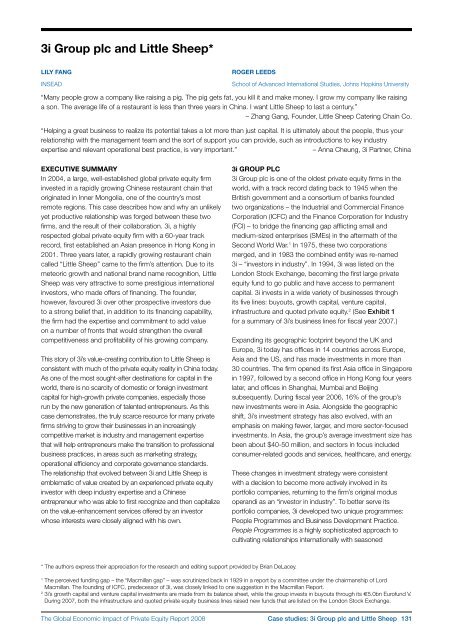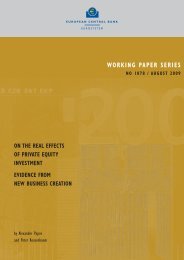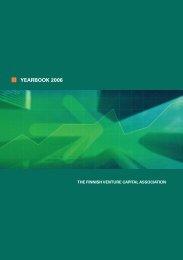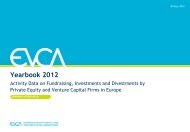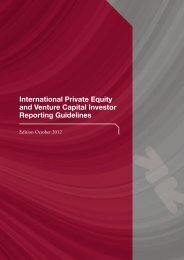The Global Economic Impact of Private Equity Report 2008 - World ...
The Global Economic Impact of Private Equity Report 2008 - World ...
The Global Economic Impact of Private Equity Report 2008 - World ...
- No tags were found...
You also want an ePaper? Increase the reach of your titles
YUMPU automatically turns print PDFs into web optimized ePapers that Google loves.
3i Group plc and Little Sheep*Lily FanginseadRoger LeedsSchool <strong>of</strong> Advanced International Studies, Johns Hopkins University“Many people grow a company like raising a pig. <strong>The</strong> pig gets fat, you kill it and make money. I grow my company like raisinga son. <strong>The</strong> average life <strong>of</strong> a restaurant is less than three years in China. I want Little Sheep to last a century.”– Zhang Gang, Founder, Little Sheep Catering Chain Co.“Helping a great business to realize its potential takes a lot more than just capital. It is ultimately about the people, thus yourrelationship with the management team and the sort <strong>of</strong> support you can provide, such as introductions to key industryexpertise and relevant operational best practice, is very important.”– Anna Cheung, 3i Partner, ChinaExecutive SummaryIn 2004, a large, well‐established global private equity firminvested in a rapidly growing Chinese restaurant chain thatoriginated in Inner Mongolia, one <strong>of</strong> the country’s mostremote regions. This case describes how and why an unlikelyyet productive relationship was forged between these tw<strong>of</strong>irms, and the result <strong>of</strong> their collaboration. 3i, a highlyrespected global private equity firm with a 60‐year trackrecord, first established an Asian presence in Hong Kong in2001. Three years later, a rapidly growing restaurant chaincalled “Little Sheep” came to the firm’s attention. Due to itsmeteoric growth and national brand name recognition, LittleSheep was very attractive to some prestigious internationalinvestors, who made <strong>of</strong>fers <strong>of</strong> financing. <strong>The</strong> founder,however, favoured 3i over other prospective investors dueto a strong belief that, in addition to its financing capability,the firm had the expertise and commitment to add valueon a number <strong>of</strong> fronts that would strengthen the overallcompetitiveness and pr<strong>of</strong>itability <strong>of</strong> his growing company.This story <strong>of</strong> 3i’s value‐creating contribution to Little Sheep isconsistent with much <strong>of</strong> the private equity reality in China today.As one <strong>of</strong> the most sought‐after destinations for capital in theworld, there is no scarcity <strong>of</strong> domestic or foreign investmentcapital for high‐growth private companies, especially thoserun by the new generation <strong>of</strong> talented entrepreneurs. As thiscase demonstrates, the truly scarce resource for many privatefirms striving to grow their businesses in an increasinglycompetitive market is industry and management expertisethat will help entrepreneurs make the transition to pr<strong>of</strong>essionalbusiness practices, in areas such as marketing strategy,operational efficiency and corporate governance standards.<strong>The</strong> relationship that evolved between 3i and Little Sheep isemblematic <strong>of</strong> value created by an experienced private equityinvestor with deep industry expertise and a Chineseentrepreneur who was able to first recognize and then capitalizeon the value-enhancement services <strong>of</strong>fered by an investorwhose interests were closely aligned with his own.3i Group Plc3i Group plc is one <strong>of</strong> the oldest private equity firms in theworld, with a track record dating back to 1945 when theBritish government and a consortium <strong>of</strong> banks foundedtwo organizations – the Industrial and Commercial FinanceCorporation (ICFC) and the Finance Corporation for Industry(FCI) – to bridge the financing gap afflicting small andmedium‐sized enterprises (SMEs) in the aftermath <strong>of</strong> theSecond <strong>World</strong> War. 1 In 1975, these two corporationsmerged, and in 1983 the combined entity was re‐named3i – “investors in industry”. In 1994, 3i was listed on theLondon Stock Exchange, becoming the first large privateequity fund to go public and have access to permanentcapital. 3i invests in a wide variety <strong>of</strong> businesses throughits five lines: buyouts, growth capital, venture capital,infrastructure and quoted private equity. 2 (See Exhibit 1for a summary <strong>of</strong> 3i’s business lines for fiscal year 2007.)Expanding its geographic footprint beyond the UK andEurope, 3i today has <strong>of</strong>fices in 14 countries across Europe,Asia and the US, and has made investments in more than30 countries. <strong>The</strong> firm opened its first Asia <strong>of</strong>fice in Singaporein 1997, followed by a second <strong>of</strong>fice in Hong Kong four yearslater, and <strong>of</strong>fices in Shanghai, Mumbai and Beijingsubsequently. During fiscal year 2006, 16% <strong>of</strong> the group’snew investments were in Asia. Alongside the geographicshift, 3i’s investment strategy has also evolved, with anemphasis on making fewer, larger, and more sector‐focusedinvestments. In Asia, the group’s average investment size hasbeen about $40‐50 million, and sectors in focus includedconsumer‐related goods and services, healthcare, and energy.<strong>The</strong>se changes in investment strategy were consistentwith a decision to become more actively involved in itsportfolio companies, returning to the firm’s original modusoperandi as an “investor in industry”. To better serve itsportfolio companies, 3i developed two unique programmes:People Programmes and Business Development Practice.People Programmes is a highly sophisticated approach tocultivating relationships internationally with seasoned* <strong>The</strong> authors express their appreciation for the research and editing support provided by Brian DeLacey.1<strong>The</strong> perceived funding gap – the “Macmillan gap” – was scrutinized back in 1929 in a report by a committee under the chairmanship <strong>of</strong> LordMacmillan. <strong>The</strong> founding <strong>of</strong> ICFC, predecessor <strong>of</strong> 3i, was closely linked to one suggestion in the Macmillan <strong>Report</strong>.23i’s growth capital and venture capital investments are made from its balance sheet, while the group invests in buyouts through its €5.0bn Eur<strong>of</strong>und V.During 2007, both the infrastructure and quoted private equity business lines raised new funds that are listed on the London Stock Exchange.<strong>The</strong> <strong>Global</strong> <strong>Economic</strong> <strong>Impact</strong> <strong>of</strong> <strong>Private</strong> <strong>Equity</strong> <strong>Report</strong> <strong>2008</strong> Case studies: 3i Group plc and Little Sheep 131


